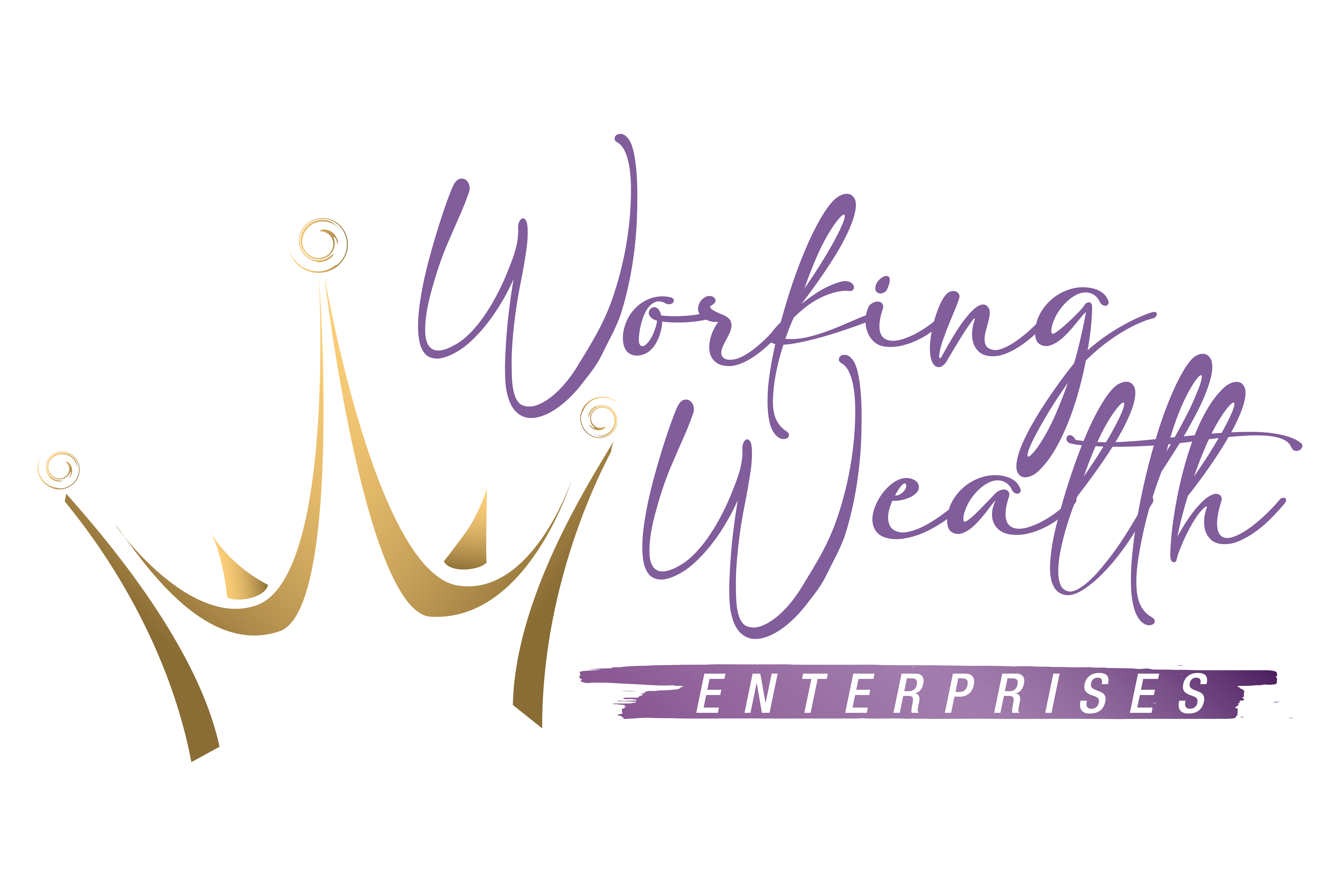Making Your Wealth Work For You!
Working Wealth Enterprises is a financial literacy company that assists families with creating the building blocks to generational wealth through understanding, building, and repairing their credit, all while providing tools to improve their income and reduce their debts.
Our Process
How Our Program Works
✔️ Identify negative, inaccurate, or erroneous items from each credit bureau with no negative impact to score.
✔️Monthly credit monitoring.
✔️Account Transparency with member access to dispute process.



Detailed Reports

Credit Education

Save Money
More About Our Program

Credit Education
We provide valuable insights and resources to decipher confusing credit reports, create strategies to build credit, and pay down debt. Our goal is to empower our clients to take charge of their credit profiles by making informed decisions that can open doors to better financial opportunities.
Affiliate Program
Learn how to get paid and eliminate your monthly fee by referring new members to our program.


Couples Credit Discount
This special offer is tailored for couples who are committed to enhancing their financial literacy and credit management together. When both partners enroll in our program, you can unlock significant savings and benefits with a reduced rate.
Consultation
Clients who have been with our program for at least 3 months are eligible for exclusive coaching sessions. These one-on-one sessions offer tailored advice, goal setting, and fine-tuning of your financial strategies. It's our way of saying "thank you" for choosing us as your partner in financial empowerment.

FAQS
WHAT IS A CREDIT SCORE?
A credit score is a number generated by a mathematical formula that is meant to predict credit worthiness. Credit scores range from 300-850. The higher your score is, the more likely you are to get a loan. The lower your score is, the less likely you are to get a loan. If you have a low credit score and you do manage to get approved for credit then your interest rate will be much higher than someone who had a good credit score and borrowed money. So, basically, having a high credit score can save many thousands of dollars over the life of your mortgage, auto loan, or credit card.
HOW OFTEN SHOULD I CHECK MY CREDIT SCORE?
Monitoring your credit score is a smart financial habit, and the frequency at which you should check it can depend on your financial situation and goals.
Regular Monitoring: For most individuals, checking your credit score at least once a year is a good starting point. This allows you to keep an eye on your overall credit health and ensure there are no errors or inaccuracies on your credit report. You can obtain a free annual credit report from each of the three major credit bureaus (Equifax, Experian, and TransUnion) through AnnualCreditReport.com.
Life Events: Certain life events, such as a major financial decision (buying a home, applying for a car loan) or a significant life change (marriage, divorce, or identity theft concerns), may necessitate more frequent credit score checks. In these cases, it's essential to stay informed about your credit standing.
Remember that monitoring your credit score is not just about the number itself but also about the information on your credit report. Ensure that all the information is accurate and up-to-date, and take action if you notice any discrepancies or signs of identity theft.
WHAT FACTORS IMPACT MY SCORE?
Your credit score is a numerical representation of your creditworthiness and is influenced by various factors that reflect your financial behavior and responsibility. Here's a detailed explanation of the key factors that impact your credit score:
Payment History (35%): The most significant factor in determining your credit score is your payment history. This includes whether you pay your bills on time. Late payments, collections, charge-offs, and bankruptcies can all have a negative impact. Consistently paying your bills by their due dates helps build a positive payment history.
Credit Utilization (30%): Credit utilization is the percentage of your available credit that you are using. Maintaining a low credit utilization ratio (typically below 30%) demonstrates responsible credit management. Maxing out credit cards or using a high percentage of your available credit can negatively affect your score.
Length of Credit History (15%): The length of time you've been using credit matters. A longer credit history generally has a positive impact on your credit score. It's one reason why it's often advised to keep older credit accounts open.
Types of Credit (10%): The mix of credit accounts you have can impact your score. Having a diverse mix, such as credit cards, installment loans, and a mortgage, can be viewed more favorably than having only one type of credit.
New Credit Inquiries (10%): When you apply for new credit, it can result in a hard inquiry on your credit report. Multiple inquiries in a short period can be seen as a risk and may lower your credit score. However, shopping around for the best rates on a single type of credit (e.g., mortgage or auto loan) is often treated as a single inquiry if done within a specific time frame.Negative Information: Certain negative events, like late payments, collections, charge-offs, and public records (e.g., bankruptcy, tax liens) can significantly impact your credit score. These negative items can remain on your credit report for several years and may take time to recover from.
It's important to note that while these are the primary factors affecting your credit score, credit scoring models may vary slightly between different credit bureaus. Additionally, building and maintaining a good credit score takes time and consistent financial responsibility. Understanding these factors and managing them wisely can help you improve and maintain a strong credit score, opening doors to better financial opportunities.
CREDIT SCORE RANGES AND THEIR MEANING
800 and Higher (Excellent) With a credit score in this range no lender will ever disapprove your loan application. Additionally, the APR (Annual Percentage Rate) on your credit cards will be the lowest possible. You’ll be treated as royalty. Achieving this excellent credit rating not only requires financial knowledge and discipline and, but also a good credit history. Generally speaking, to achieve this excellent rating you must also use a substantial amount of credit on an ongoing monthly basis and always repay it ahead of time.
700 – 799 (Very Good) 27% of the United States population belongs to this credit score range. With this credit score range you will enjoy good rates and approved for nearly any type of credit loan or personal loan, whether unsecured or secured.
680 – 699 (Good) This range is the average credit score. In this range approvals are practically guaranteed but the interest rates might be marginally higher. If you’re thinking about a long term loan such as a mortgage, try working to increase your credit score higher than 720 and you will be rewarded for your efforts – your long term savings will be noticeable.
620 -679 (OK or Fair) Depending on what kind of loan or credit you are applying for and your credit history, you might find that the rates you are quoted aren’t best. That doesn’t mean that you won’t be approved but certain restrictions will apply to the loan’s terms.
580 – 619 (Poor) With a poor credit rating you can still get an unsecured personal loan and even a mortgage, but the terms and interest rates won’t be very appealing. You’ll be required to pay more over a longer period of time because of the high interest rates.
500 – 579 (Bad) With a score in this range you can get a loan but nothing even close to what you expect it to be. Some people with bad credit apply for loans to consolidate debt in search for a fresh start. However, if you decide to do that then proceed cautiously. With a 500 credit score you need to make sure that you don’t default on payments or you’ll be making your situation worse and might head towards bankruptcy, which is not what you want.
499 and Lower (Very Bad) If this is your score range you need serious and professional assistance with how you handle your credit. You’re making too many credit blunders and they will only get worse if you don’t take positive action. If you are thinking of a loan then keep in mind that if you do find a sub-prime lender (which won’t be easy), the rates will be very high and the terms will be very strict. We recommend that you fix your credit and only then move on to applying for a loan.
What Are Our Customers Saying ?
Feedback from our delighted clientele.

When I reached out, my credit score was in a challenging place, and securing a stable future for my family seemed like a distant dream. Working Wealth’s sound advice and personalized approach led to my improved credit score, a boost in my confidence of financial literacy, and better opportunities to save money with more favorable loan terms. They are committed to helping you achieve the financial stability and the success you deserve.
Angela Patterson

Working Wealth's credit repair service not only improved my credit score but also educated me on effective credit management strategies. With their guidance, I made the necessary changes to my financial habits, and the results were remarkable. Not only did I see my credit score rise, but I also gained the knowledge and confidence to leverage credit responsibly.
Justin Barringer


